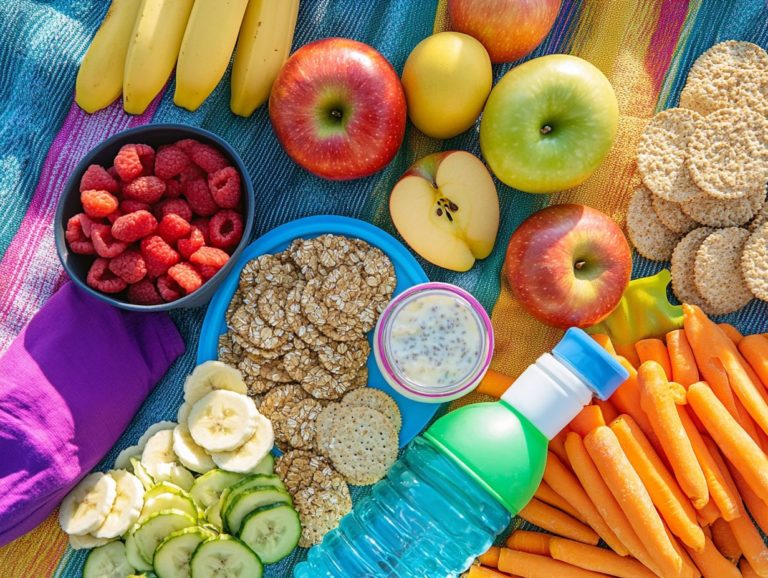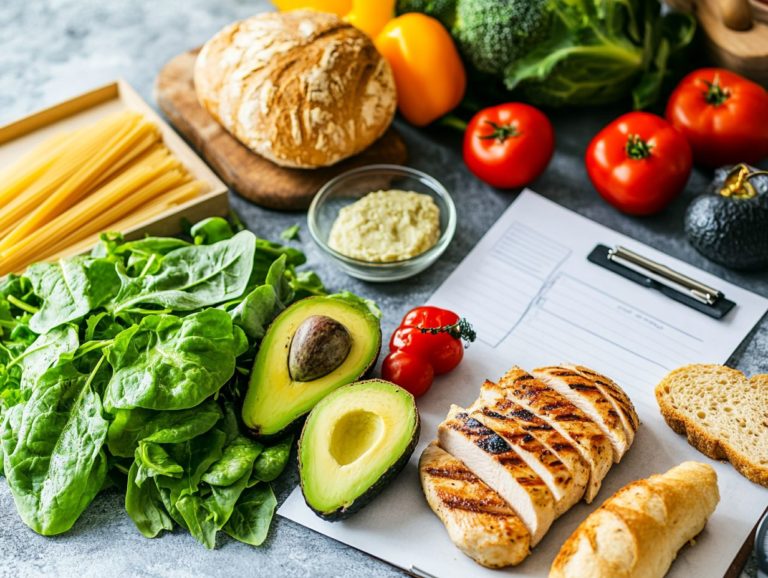Nutrition for Runners: Fueling for Endurance
Running transcends the simple act of placing one foot in front of the other; it embodies a sophisticated interplay of training, strategy, and nutrition.
For you, as a runner striving to elevate your performance and endurance, grasping the pivotal role of diet is essential. This article delves into the importance of nutrition, highlighting your macronutrient needs, vital vitamins and minerals, and effective fueling strategies for both pre-run and post-run recovery.
Whether you re preparing for a long race or seeking to enhance your running experience, making the right nutritional choices can significantly impact your results.
Join us in uncovering how to optimize your diet for peak performance.
Contents
- Key Takeaways:
- The Importance of Nutrition for Runners
- Macronutrients for Endurance Running
- Micronutrients for Runners
- Pre-Run Fueling Strategies
- During-Run Nutrition
- Post-Run Recovery Nutrition
- Meal Planning for Endurance Running
- Frequently Asked Questions
- Why is nutrition crucial for runners?
- What should runners eat before a long-distance run?
- How can nutrition help with post-run recovery?
- What are some good sources of carbohydrates for endurance runners?
- Is it necessary to take supplements for endurance running?
- How can a runner maintain proper hydration during a long run?
Key Takeaways:
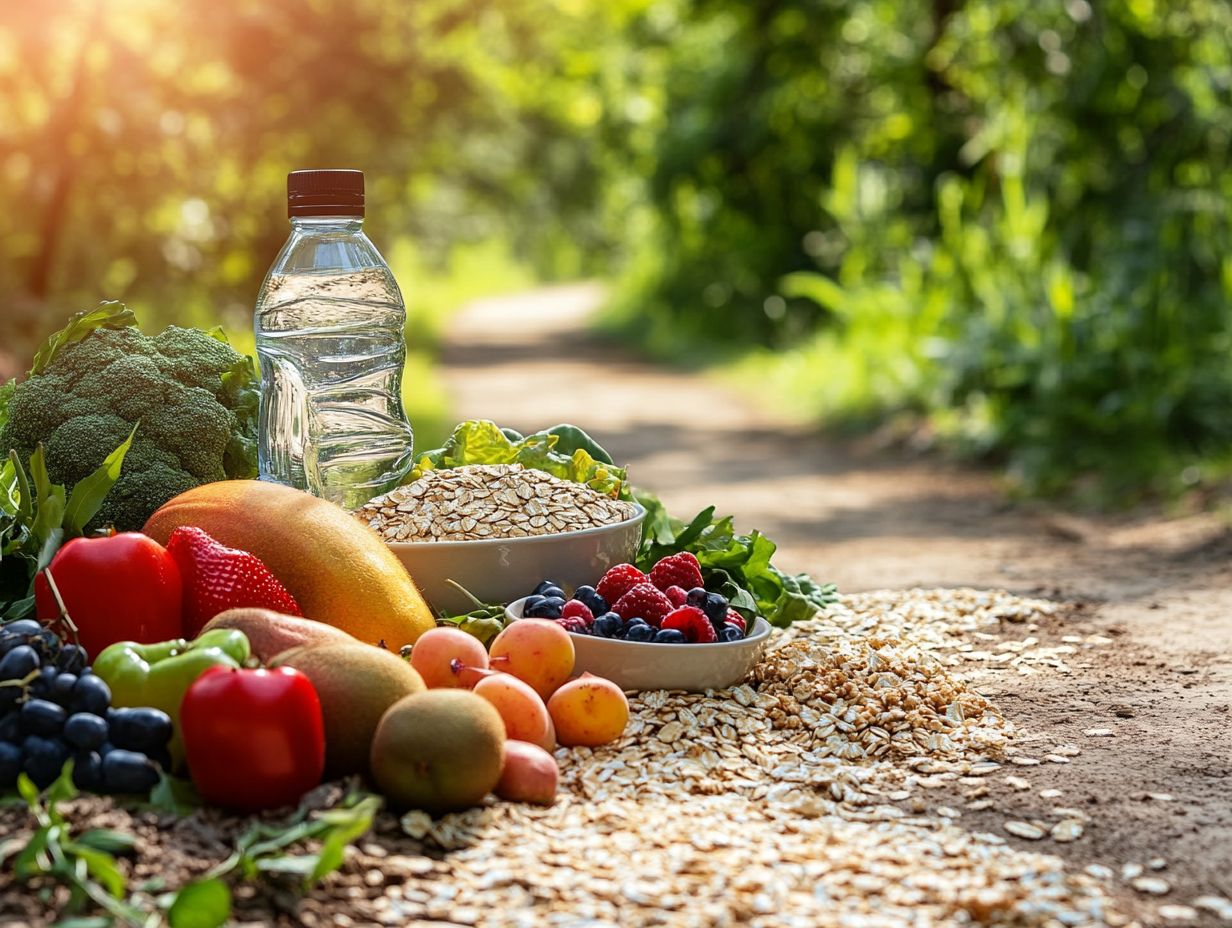
- Proper nutrition is essential for runners, as it can improve performance and prevent fatigue.
- Endurance runners should focus on a balance of carbohydrates, protein, and healthy fats in their diet to support their training and recovery.
- Fueling before, during, and after runs with the right nutrients can help maintain energy levels and aid in recovery.
The Importance of Nutrition for Runners
Understanding the significance of nutrition for runners is vital. It helps you achieve peak performance, especially regarding fueling and recovery.
A well-balanced diet tailored for runners can profoundly influence your energy expenditure. This enables you to make informed nutritional choices that elevate your lifestyle and running habits.
It s all about grasping the dynamics of energy in versus energy out. This is crucial for endurance runners who want to enhance their performance sustainably.
How Proper Nutrition Can Improve Performance
Proper nutrition is key for your running success. It allows you to achieve a perfect balance between energy in and energy out while optimizing recovery and overall well-being.
A carefully structured diet designed for runners can be transformative. It focuses on your carbohydrate intake, hydration levels, and the timing of your nutrient consumption.
Research consistently highlights that carbohydrates are your primary fuel source during endurance activities. Ensuring you consume an adequate amount both before and after your workouts is essential.
Hydration is critical. Even slight dehydration can hurt your performance. For example, sipping on electrolyte-rich beverages during those long runs can help maintain optimal hydration levels.
Timing also plays a key role. Incorporating a blend of fast-acting carbohydrates immediately post-run can significantly enhance your recovery. Many successful athletes generously share their personalized nutritional strategies, reinforcing the necessity of a tailored dietary approach in reaching your peak performance.
Macronutrients for Endurance Running
Macronutrients are essential for your endurance running. They serve as the vital fuel needed for peak performance and effective recovery.
It s important for you to grasp the right balance of carbohydrates, protein, and fats to meet your energy demands and support your overall health.
A thoughtfully structured diet that prioritizes adequate nutrient intake can significantly elevate your running performance and facilitate efficient fueling and recovery.
Ready to boost your running performance? Let s explore how to fuel your body for success!
Carbohydrates, Protein, and Fat Requirements
For endurance athletes like you, grasping the essentials of carbohydrate, protein, and fat intake is crucial for meeting your energy needs while maximizing performance.
These macronutrients play vital roles in fueling your physical activity and aiding recovery, significantly impacting your overall stamina and endurance. Carbohydrates are important because they serve as your go-to source of energy during prolonged exercise. Proteins are key for muscle repair and growth. And don t forget about healthy fats; they help build long-term energy reserves, staving off fatigue during extended workouts.
It s generally advisable for endurance athletes to aim for about 60-70% of daily calories from carbohydrates, 15-20% from proteins, and 20-30% from fats. Choosing complex carbs like whole grains and fruits can boost your glycogen stores, while incorporating chicken and legumes provides necessary protein. Adding nuts and avocados ensures your healthy fat intake rounds out your diet, supporting optimal performance throughout your training and competitions.
Micronutrients for Runners
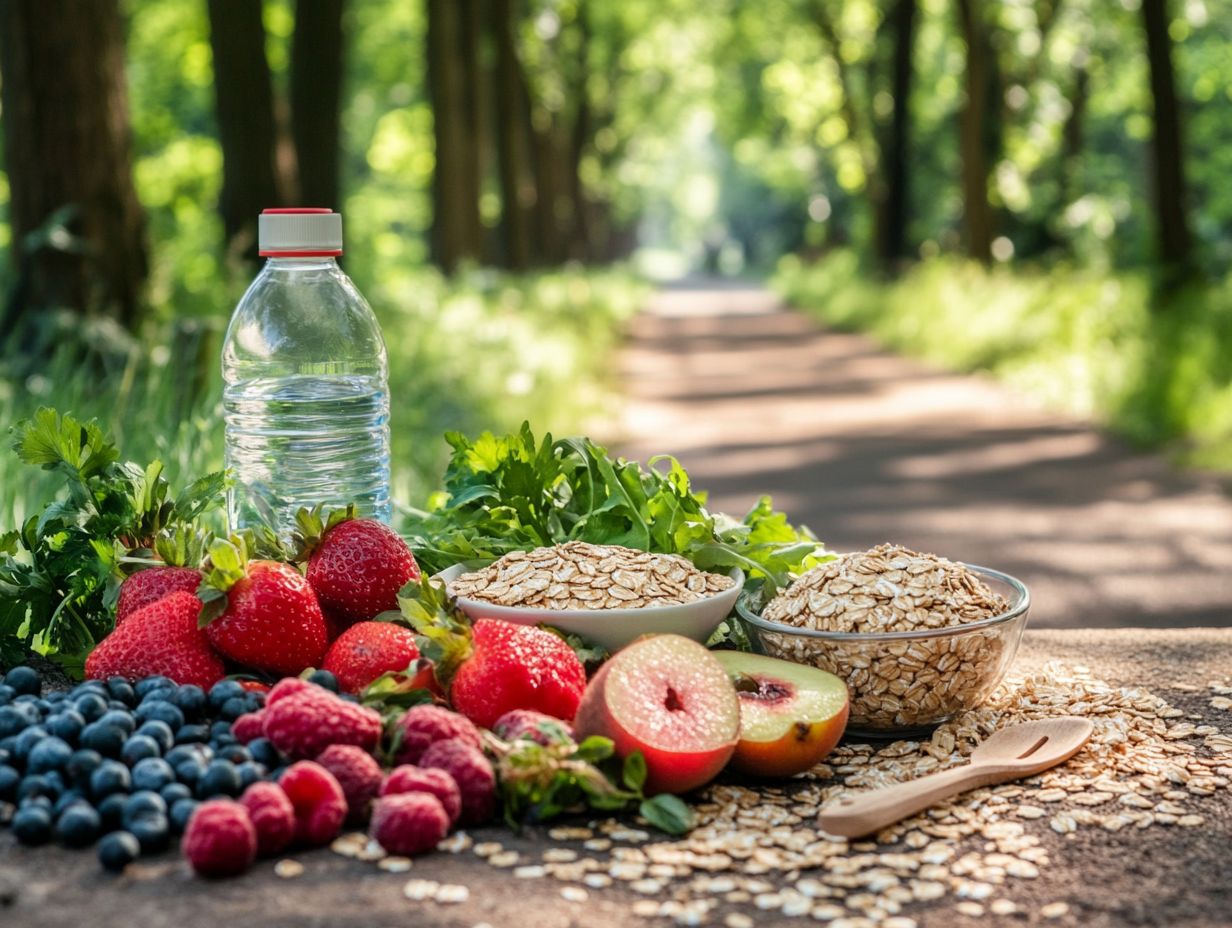
Micronutrients, including essential vitamins and minerals, are vital for enhancing your health and performance as a runner. They significantly contribute to maintaining strong bones and a resilient immune system, ensuring you stay at the top of your game.
Key Vitamins and Minerals for Endurance
Key vitamins and minerals are crucial for endurance runners, playing essential roles in bone health, immune function, and maintaining proper hydration levels.
Among these vital nutrients, Vitamin B12 shines for its critical role in energy metabolism and red blood cell formation both essential for sustaining your energy during long runs. You ll primarily find this vitamin in animal products like meat and dairy, which makes it a key consideration if you’re following a plant-based diet.
Vitamin D is another powerhouse, significantly aiding in calcium absorption and promoting bone density, helping to prevent injuries. Calcium itself is essential for muscle contractions and overall endurance, with dairy products, leafy greens, and fortified alternatives being excellent sources.
Don t forget about iron! This essential mineral is vital for transporting oxygen to your muscles, enhancing both performance and recovery. Lean meats and beans are primary sources, highlighting the importance of a balanced diet rich in these nutrients for achieving your optimal athletic output.
Pre-Run Fueling Strategies
Pre-run fueling strategies are vital for enhancing your performance and ensuring you have the energy required for long runs or races. Understanding what to eat before a long run is crucial; it involves mastering the timing of your nutrient and carbohydrate intake to adequately prepare your body for exertion.
By adopting an effective runner’s diet that takes these factors into account, you can elevate your running performance significantly.
What to Eat Before a Long Run or Race
Understanding what to eat before a long run or race can profoundly impact your energy levels, performance, and recovery as a runner. Proper nutrition tailored to your unique needs ensures that you can sustain your energy throughout the run.
Carbohydrates should be your primary focus; consider a meal like oatmeal adorned with banana and honey, consumed about 1.5 to 3 hours before the event. This combo provides a steady release of energy, setting you up for success.
If you re looking for a quicker option, try a slice of whole-grain toast slathered with almond butter and fresh fruit about 30 minutes before your run. This can optimize hydration and energy availability right when you need it most.
Choosing the right foods not only enhances your performance but also facilitates a smoother recovery process afterward. This way, you can bounce back more quickly and stick to your training schedule without missing a beat.
Feel free to share your own pre-run meals or tips in the comments below let’s create a supportive community!
During-Run Nutrition
During-run nutrition keeps your energy and hydration levels high, allowing you to sustain performance over longer distances. Having the right fuel and hydration strategy in place can transform your running experience.
Hydration and Energy Gels
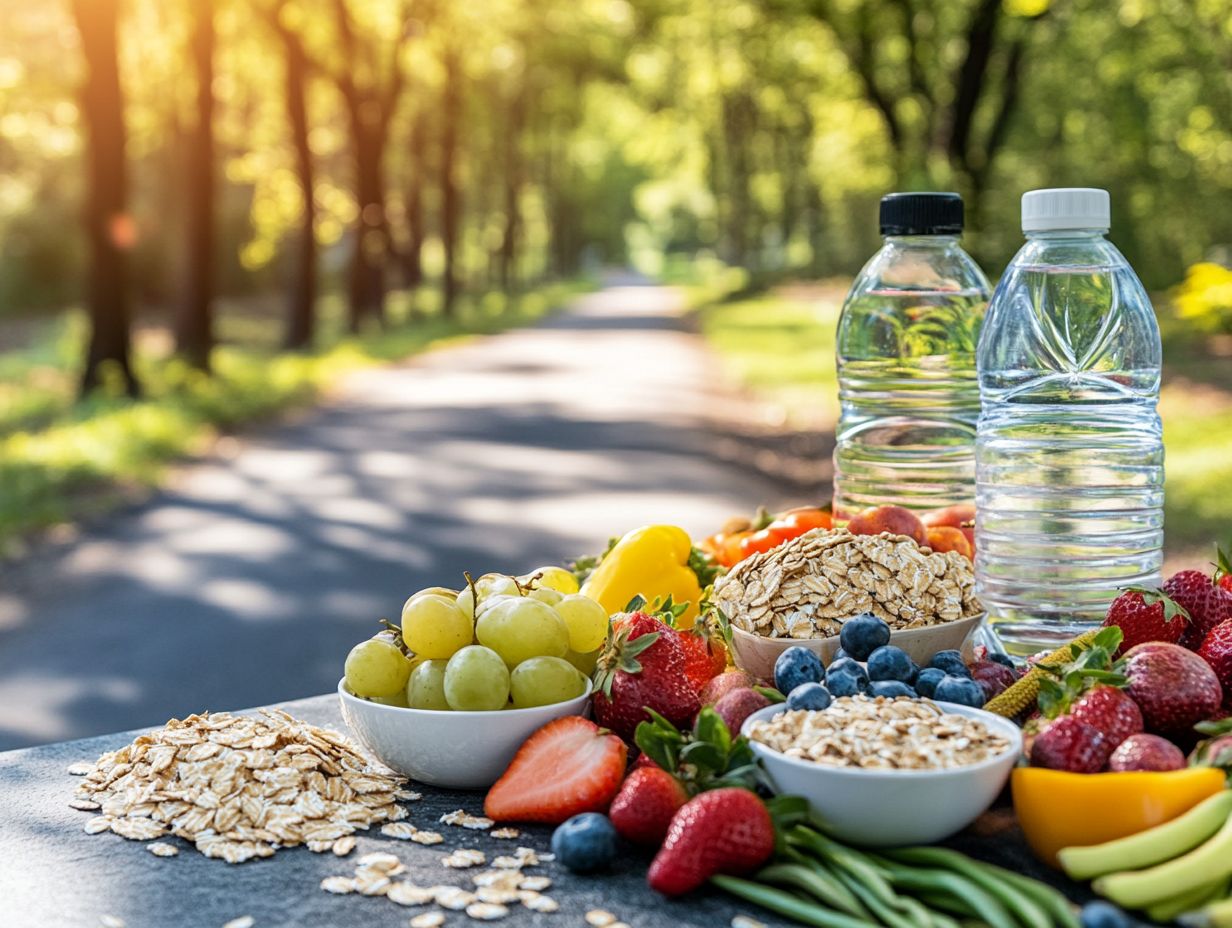
Hydration and energy gels are essential for maintaining optimal performance during your run. They deliver vital electrolytes, crucial for regulating nerve function and muscle contractions.
These gels also provide carbohydrates, which serve as a quick source of energy, helping you sustain stamina through challenging stretches. For runners tackling long distances, using these gels strategically is key to fending off fatigue, stabilizing blood sugar levels, and preventing dehydration.
Incorporating these elements into your routine optimizes your endurance and elevates your overall running experience.
Post-Run Recovery Nutrition
Post-run recovery nutrition is crucial for replenishing your body’s stored energy and repairing muscle tissue after intense activity. What you consume after your run significantly enhances your performance and prepares you for your next challenge.
Importance of Protein and Carbohydrates
Protein and carbohydrates are vital for replenishing energy and supporting muscle repair after running.
These nutrients work together to ensure your body recovers efficiently. Carbohydrates restore energy levels after intense workouts, while protein aids in repairing and building muscle tissue.
A simple post-run meal could be a turkey sandwich on whole-grain bread, accompanied by fruit and yogurt. This combination effectively supports energy restoration and muscle repair.
Meal Planning for Endurance Running
Effective meal planning for endurance running is crucial for meeting your nutritional needs and maintaining peak performance throughout training and races. Thoughtful dietary choices fuel your body for the demands of long runs and intense workouts.
Sample Meal Plans and Recipes
Sample meal plans and recipes tailored for runners provide valuable insights into structuring a balanced diet that supports endurance training.
Incorporating a variety of nutrient-dense foods enhances your performance and recovery while allowing you to enjoy delicious meals. Meals rich in carbohydrates, lean proteins, healthy fats, and a wide range of vitamins and minerals are essential for maintaining energy during long runs.
Exploring diverse recipes not only keeps your diet exciting but also introduces vital nutrients. Whether you experiment with whole grains, seasonal vegetables, or different protein sources, these choices are critical for optimal health and sustaining athletic pursuits.
Frequently Asked Questions
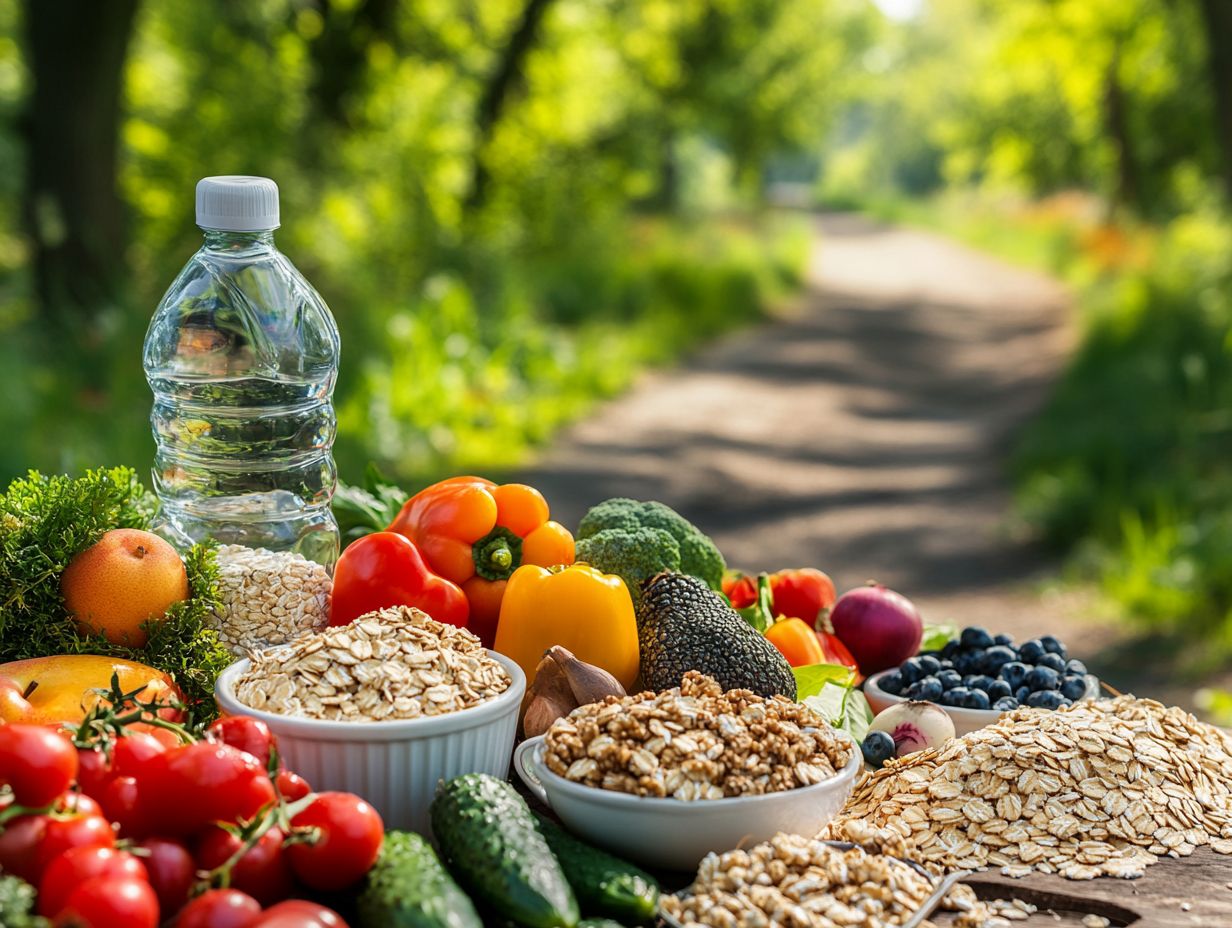
Why is nutrition crucial for runners?
Proper nutrition is essential for optimal performance and overall health. For those following a plant-based diet, nutrition for vegan athletes provides the necessary energy and nutrients to support the demands of endurance running and aids in recovery and injury prevention.
What should runners eat before a long-distance run?
Runners should eat a balanced meal with complex carbohydrates, lean protein, and healthy fats before a long run.
Options include oatmeal with nuts and fruit, a whole grain wrap with chicken and avocado, or a protein smoothie.
How can nutrition help with post-run recovery?
Grab a tasty mix of carbs and protein right after your run to supercharge your recovery!
Foods like bananas, Greek yogurt, and whole grain toast with nut butter are excellent choices.
What are some good sources of carbohydrates for endurance runners?
Endurance runners should choose complex carbohydrates, such as whole grains, fruits, and starchy vegetables.
They provide sustained energy and important vitamins and minerals for your health.
Is it necessary to take supplements for endurance running?
Supplements can help some runners, but they aren’t a substitute for a balanced diet.
Consult a healthcare professional before starting any supplements and focus on getting nutrients from whole, natural foods.
How can a runner maintain proper hydration during a long run?
Don t wait until you re thirsty! Sip water or a sports drink every 15-20 minutes.
Include electrolyte-rich foods like bananas, avocado, and coconut water to replace lost electrolytes.

